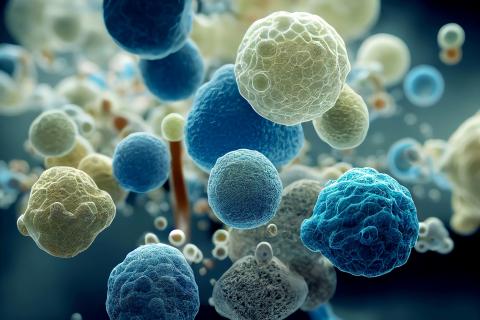Reactions: Mother's microbiota may pass genes to baby's microbiota by horizontal transfer
The establishment of the baby's microbiota occurs around the time of birth, when it receives bacteria directly from the mother. A study in the journal Cell suggests that genes can also be transmitted between them by horizontal transfer, without the need for the passage of these micro-organisms.

Rosa del Campo - microbiota horizontal EN
Rosa del Campo
Researcher at the Ramón y Cajal Hospital and member of the Specialised Group for the Study of the Human Microbiota of the Spanish Society of Infectious Diseases and Clinical Microbiology (SEIMC-GEMBIOTA)
The study is very robust. They have recruited 70 mother-child pairs and the longitudinal follow-up is very comprehensive. The techniques used are appropriate and I liked the approach because of the added contribution of metabolomics. It should be borne in mind that studies with newborn children are complicated, so this work has a lot of merit.
Regarding horizontal transfer, their results are based on doing complete metagenomics on all the DNA and then analysing the genes that are identical to see if they are present in both the mother's and the child's faeces. They have focused mainly on genes that are necessary to be able to digest food well, especially milk carbohydrates, and what they observe is that these genes for metabolic pathways for food digestion are sometimes found in different bacteria, suggesting that there is a horizontal transfer between the mother's and the child's bacteria. Increased expression of conjugation, transduction and transformation genes is also observed, but this is mainly attributed to the activation of phages that are able to pass genetic material from one bacterium to another.
It is impossible to determine exactly whether this horizontal transfer has occurred, but given the high discriminatory power of genome assembly, it seems that it may be true.
It has always been argued that the establishment of the microbiota at birth is mainly conditioned by the mother's bacteria acquired through the birth canal. In nature there are many examples of mothers inoculating their babies with their own faeces so that they can have the metabolic pathways for food degradation, because without them nutrition cannot be guaranteed. In the case of humans we have evolved to deliveries in an aseptic hospital environment and in many cases with exposure to antibiotics by caesarean section or prophylaxis for different pathogens.
This article covers a large workload for which there has not been such a solid background. The monitoring of inflammatory parameters in stool and blood demonstrates novel work. Breastfeeding involves exposure to pathogens conveyed through the mammary microbiota, leading to early immunological exposure for lifelong tolerance. The researchers hypothesise that breastfeeding leads to a reduced likelihood of autoimmune diseases. The production of biogenic amines/neurotransmitters by the microbiota has also been explored, a novel investigation especially in mother/child pairs.
The implications of this work are that perhaps we should monitor the implantation of the microbiota in relation to its metabolome to correct possible deficits in metabolic pathways that are desirable for future health.
Much of the work has been done by inferring results from stool sequences. This may not be completely true, but there is a high probability that it is. It would have been better to perform the metabolome on the infants' serum, but I imagine it is not easy to get newborns spiked every month.
Mireia Valles - microbioma horizontal EN
Mireia Valles-Colomer
Head of the Microbiome Research Group, Department of Medicine and Life Sciences, Pompeu Fabra University
This is a novel study in which the researchers put forward an interesting hypothesis: could bacteria that are not transmitted from mother to baby (i.e. not transmitted vertically) still influence the baby's microbiome through the transmission of specific genes to other bacteria (horizontal gene transfer)?
Demonstrating horizontal gene transfer is complicated. What the authors did is to compare the DNA sequences of the genes they detected in 70 mothers and their babies and, in cases where the sequences are identical, transfer is inferred.
The transmission of bacteria from mother to baby is very important for the formation of our microbiome, which is a great ally for our health: apart from aiding digestion, it protects us from pathogens and influences the development of the immune system. The first bacteria that reach our gut come from our mothers during and shortly after birth. Thus, babies born by caesarean section receive fewer bacteria from their mothers, and it is thought that this may be related to the development of allergies and autoimmune diseases. The transfer of genes from one bacterium to other bacteria of different species provides a new indirect mechanism that would complement the transmission of bacteria from mother to baby.
Metagenomics is a very new and developing field, and there are variant methods for inferring the transmission of the microbiome from one person to another. Once these methods are consolidated and the results replicated in independent data, the interesting results of this study can be confirmed.
Carmen Muñoz - microbioma horizontal EN
Carmen Muñoz Almagro
Head of the Infectious Diseases and Microbiome research group and director of the Microbiology Laboratory at the Hospital Sant Joan de Déu in Barcelona.
This is a highly interesting study that shows for the first time the importance of metabolites produced by the maternal microbiota in the development of the newborn's microbiota independently of the transfer of microbial strains. Although further studies are needed to confirm these initial data, the results of Xavier Ramnik and colleagues would reinforce the potential therapeutic use of postbiotics, in which the benefit is not produced by the transfer of live microbial strains but by the products generated by the bacteria.
Vatanen et al.
- Research article
- Peer reviewed
- Observational study
- People


